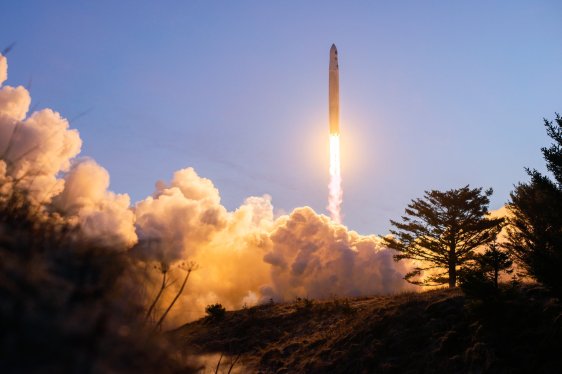Astra Space Goes Private Again After Failing to Secure Alternate Investment
A Precipitous Fall for the Launch Company
In a shocking turn of events, Astra Space, the launch company that went public in 2021 at a $2.1 billion valuation, is going private again after months of burning cash and failing to secure alternate investment. The company announced on Thursday that its board had accepted an offer from its CEO, Chris Kemp, and its CTO, Adam London, to purchase the remaining Astra stock at a price of $0.50 per share.
Astra’s Decline
This is a precipitous fall for the company, which raised nearly $500 million from investors on the premise of an ultra-cheap launch vehicle that could be scaled to execute hundreds of missions per year. In an investor presentation from February 2021, Astra touted a ‘mass produced portable launch system’ that could launch from anywhere in the world.
The Unfulfilled Promise
However, the company never achieved this goal, facing a series of setbacks including an alarming sideways launch anomaly in 2021 and a number of false starts for commercial launches over the years. Kemp’s suggestion that failure rates mattered less the more frequent launches were may also have rattled potential customers.
The Struggle to Turn Apollo Fusion into Revenue
At the time Astra completed its SPAC merger, it also acquired Apollo Fusion, an electric propulsion developer for spacecraft, with the aim of integrating those systems into an Astra satellite constellation. However, that constellation never came to fruition, and while the company did succeed in selling many Apollo Fusion propulsion systems, it has struggled to turn that backlog into revenue.
The Offer from Kemp and London
Things came to a head last November, when Kemp and London proposed to take the company private at $1.50 a share – around double the price the stock was trading at then. After that deal stalled, they submitted a revised offer. A special committee of the board, assembled to review Astra’s options, warned in a filing at the beginning of the month that the only alternative to Kemp and London’s proposal was bankruptcy.
The Road Ahead
The company announced on Thursday that it will cease trading on the Nasdaq when the deal is expected to close in the second quarter of 2024. This marks the end of an era for Astra, which had been touted as a leader in the private space industry.
Astra’s History
In 2021, Astra raised $500 million from investors on the premise of its ultra-cheap launch vehicle that could be scaled to execute hundreds of missions per year. The company’s SPAC merger also included the acquisition of Apollo Fusion, an electric propulsion developer for spacecraft.
Timeline of Events
- February 2021: Astra presents investor presentation showcasing a ‘mass produced portable launch system’ that can launch from anywhere in the world.
- 2021: Kemp’s suggestion that failure rates mattered less the more frequent launches were may have rattled potential customers.
- November 2023: Kemp and London propose to take the company private at $1.50 a share – around double the price the stock was trading at then.
- January 2024: The special committee of the board warns in a filing that the only alternative to Kemp and London’s proposal is bankruptcy.
Conclusion
The deal to take Astra private marks a significant shift for the company, which had been touted as a leader in the private space industry. With its ultra-cheap launch vehicle failing to deliver on its promise, Astra has struggled to turn a profit and secure alternate investment. The future of the company remains uncertain, but one thing is clear: the decline of Astra Space is a cautionary tale for investors and entrepreneurs alike.
Astra’s Future
The deal to take Astra private marks a significant shift for the company, which had been touted as a leader in the private space industry. With its ultra-cheap launch vehicle failing to deliver on its promise, Astra has struggled to turn a profit and secure alternate investment. The future of the company remains uncertain, but one thing is clear: the decline of Astra Space is a cautionary tale for investors and entrepreneurs alike.
Astra’s Legacy
Despite its struggles, Astra has made significant contributions to the space industry. The company’s work on Apollo Fusion has paved the way for further innovation in electric propulsion systems. As Astra moves forward as a private company, it will be interesting to see how it continues to push the boundaries of space technology.
Astra’s Impact
The decline of Astra Space is not just a story about a failed startup; it’s also a reminder of the risks and challenges associated with investing in emerging technologies. As investors, entrepreneurs, and policymakers, we must learn from Astra’s experience and approach innovation with caution and foresight.
Related Articles
- The Rise and Fall of Private Space Companies
- The Challenges of Scaling Innovation
- A Cautionary Tale for Investors and Entrepreneurs
Sources
- "Astra Space Files for IPO, Raises $500 Million" (2021)
- "Apollo Fusion Joins Astra in Bid to Dominate Small Satellite Launches" (2021)
- "Astra’s CEO: We’re Not Just a Launch Service Provider" (2022)
About the Author
Aria Alamalhodaei is a technology and business journalist covering the intersection of innovation and policy. She has written for numerous publications, including Forbes, Fortune, and Wired.




